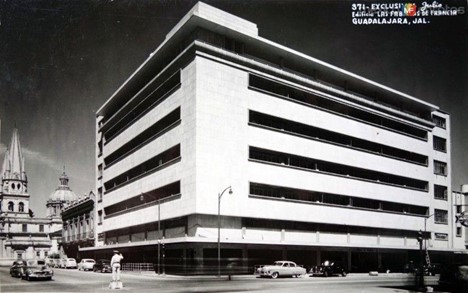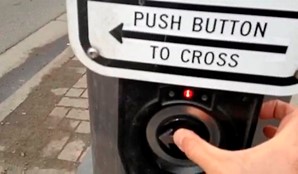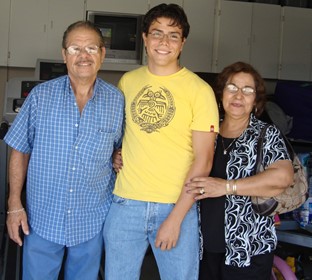Hispanic Heritage Month 2020: Opportunity, Welcome, and Family

Editor’s Note: This blog post is the second in a two-part series celebrating National Hispanic Heritage Month through the voices of our employees and members of the Latinx e Hispanos Unidos Employee Inclusion Group (EIG). Today, Alejandro (Alex) Figueroa, a manager at our Security Operation Center based in Guadalajara, shares his story and thoughts on the importance of this celebration. Read the first blog post here.
On July 4, 2001, I was 13 years old and traveling on an airplane for the first time. I was visiting family in the United States, traveling alone because my parents had to work. In hindsight, this experience was a huge gift from my parents, aunt, and uncle that I will always be grateful for.
My uncle and aunt emigrated to the United States back in the 1960s. Before that, my uncle drove buses for a living in our hometown of Guadalajara. My aunt—my dad’s sister—worked as a hair stylist at the department store Las Fábricas de Francia. After they got married, they decided to look for opportunities in the United States, eventually moving to Los Angeles, California.
My carry-on item on the flight was a box containing 12 bottles of habanero sauce, a special request from my uncle as he could not find them in Southern California. The flight was fun and terrifying at the same time; there were a bunch of kids also traveling solo, and just one flight attendant taking care of all us. I was kind of scared because I knew I would not be able to understand anyone once we landed—at the time, I only spoke Spanish. As a shy and insecure kid with only a very basic knowledge of English that I learned in junior high and “Inglés Sin Barreras”, I didn’t feel prepared for the challenge.
“What’s in the box?” the customs agent asked when we’d landed. I was terrified I might be in trouble, but when the flight attendant replied “Hot sauce!” the officer just waved his hand and we continued walking through to the customs gate. When the next customs agent said, “Passport, please,” I froze, not understanding what he’d said. The flight attendant reached for the passport hanging around my neck and handed it to the agent. “Your passport expires today?” the agent said with disbelief and called over another agent. After examining it, they simply shrugged and let me into the United States.
The Los Angeles International Airport was amazing! I felt lost, everything was enormous. After the flight attendant took me to where my uncle and aunt waited, they signed some papers and we left.
As we approached the parking lot, I continued to be amazed by everything around me; even the “Push Button To Cross” sign was new to me. We hopped into my uncle’s car and off we went. We drove along the L.A. freeways for around 40 minutes (it reminded me of this Goofy cartoon) and finally arrived at my uncle and aunt’s house.
“Mijo te compré esta playera, cambiate” my aunt said, which vaguely translates into, “Kiddo, I bought this t-shirt for you, get dressed.” It was a blue t-shirt with the flag of the United States on it; I was ready to start celebrating my first American Independence Day.
We drove to my uncle and aunt’s in-laws. The charcoal grill was ready, smoke everywhere, people having fun, drinking beer. It felt like home, but with hamburgers instead of steak, chorizo, tortillas, and salsa. “Él es mi sobrino Alex de Guadalajara, hijo de mi hermano Roberto” (“He’s my nephew Alex from Guadalajara, son of my brother Roberto”) my aunt said, introducing me to all the extended family. Questions rained down on me from everybody in a mix of Spanish and English. “Do you want a soda? Juice?” “Are you hungry?” “Come have a hamburger.” “How was your flight?” “How’s your tío and tía back in Guadalajara?” “How are your mom and dad?” “Are you tired?” “Do want to use the bathroom?” “Do you want water?” It was a little overwhelming, but at the same time I could feel their warmth. People that I just met were opening their house and their hearts.
I ate and then I started chatting with the other kids with my limited English skills and with the adults in Spanish. Then a very excited inquiry: "Are you ready for fireworks?" I didn’t know what “fireworks” meant until they showed me. My eyes were wide open and a big smile appeared on my face as the night came and the sky blew up, literally.
Do you guys have a Fourth of July in Mexico? someone asked. Of course we do, I replied, and explained Mexico’s Independence Day celebrations. The two holidays turned out to be very similar: families gather to have fun, there’s beer and fireworks, and a grill is involved. I really enjoyed that night, and I realized that no matter the place, we always find a way to have fun with friends and family.
I spent that whole summer in Southern California, learning English and feeling the occasional culture shock. I learned about other people who also migrated here, looking for opportunities to better themselves. My aunt and uncle built a legacy by cleaning office buildings at night and taking care of their children during the day. Now my cousins have families of their own, and live good lives.
My aunt and uncle ended up becoming citizens of the United States, but I know they carry Mexico in their hearts.
As I said before, I recognize and appreciate the opportunity they gave me. That early experience is why I’m able to have this awesome job—first by learning and practicing English where it’s spoken, and by understanding that no matter the dream, you can make it come true if you work hard enough to make it happen. I’ve visited many times since then, and each time I’ve been received with open arms. The story of family, of welcome and opportunity that so many of us share is, to me, at the heart of what our celebration of National Hispanic Heritage Month is truly about.


